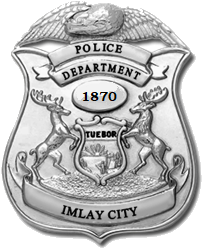Professionalism ~ Integrity ~ Honor ~ Respect ~ Trust
Staff
Police Chief
Imlay City, MI 48444
Mailing Address
Imlay City Police Department
395 E. Third Street
Imlay City, MI 48444
Documents
-
-
pdf
-
pdf
-
pdf
- Use of Force Policy
-
pdf
-
pdf
-
pdf
-
pdf
-
pdf
-
pdf
-
pdf
-
-
Phone Numbers
All Emergencies: Dial 911
Non-emergency: (810) 724-2345
For Central Dispatch: (810) 667-0292
Road Patrol: 24-hour service
Other Important Phone Numbers
Lapeer County Sheriff Department: (810) 664-1801
Lapeer County Animal Control: (810) 667-0236
Lapeer County Prosecuting Attorney: (810) 667-0326
Lapeer District Court (Tickets, email: Hearings, Etc.): (810) 667-0314
Michigan State Police – Lapeer: (810) 664-2905
Thumb Narcotics Unit – Tip Number: (877) TNU-TIPS (868-8477)
Burn Permits
Burn permits are issued online for up to 3 days.
Pistol Permits
PISTOL PERMITS are no longer available through the Imlay City Police Department. Please contact the Lapeer County Sheriffs Department.
Mission Statement
“We are committed to serving our community to enhance the quality of life and to nurture public trust by holding ourselves to the highest standards of performance and ethics. Our officers are determined to serve as a deterrent to crime, develop relationships with community groups, residential and business organizations, and promote a safe environment receptive to visitors and residents alike. The Imlay City Police Department has, and shall continue to provide service of the highest quality to its community, and to foster a community partnership to prevent crime.”
Community Policing
Sir Robert Peel’s
Principles of Law Enforcement
1829
1. The basic mission for which police exist is to prevent crime and disorder as an alternative to the repression of crime and disorder by military force and severity of legal punishment.
2. The ability of the police to perform their duties is dependent upon public approval of police existence, actions, behavior and the ability of the police to maintain pubic respect.
3. The police must secure the willing cooperation of the public in voluntary observance of the law to be able to secure and maintain the public respect.
4. The degree of cooperation of the public that can be secured diminishes, proportionally, to the necessity for the use of physical force and compulsion in achieving police objectives.
5. The police seek and preserve public favor, not by catering to public opinion, but by constantly demonstrating absolutely impartial service to the law, in complete independence of policy, and without regard to the justice or injustice of the substance of individual laws; by ready offering of individual service and friendship to all members of society without regard to their race or social standing, by ready exercise of courtesy and friendly good humor; and by ready offering of individual sacrifice in protecting and preserving life.
6. The police should use physical force to the extent necessary to secure observance of the law to restore order only when the exercise of persuasion, advice and warning is found to be insufficient to achieve police objectives; and police should only use the minimum degree of physical force which is necessary on any particular occasion for achieving a police objective.
7. The police at all times should maintain a relationship with the public that gives reality to the historic tradition that the police are the public and the public are the police; the police are the only members of the public who are paid to give full-time attention to duties which are incumbent on every citizen in the intent of community welfare.
8. The police should always direct their actions toward their functions and never appear to usurp the powers of the judiciary by avenging individuals or the state, or authoritatively judging guilt or punishing the guilty.
9. The test of police efficiency is the absence of crime and disorder, not the visible evidence of police action in dealing with them.





